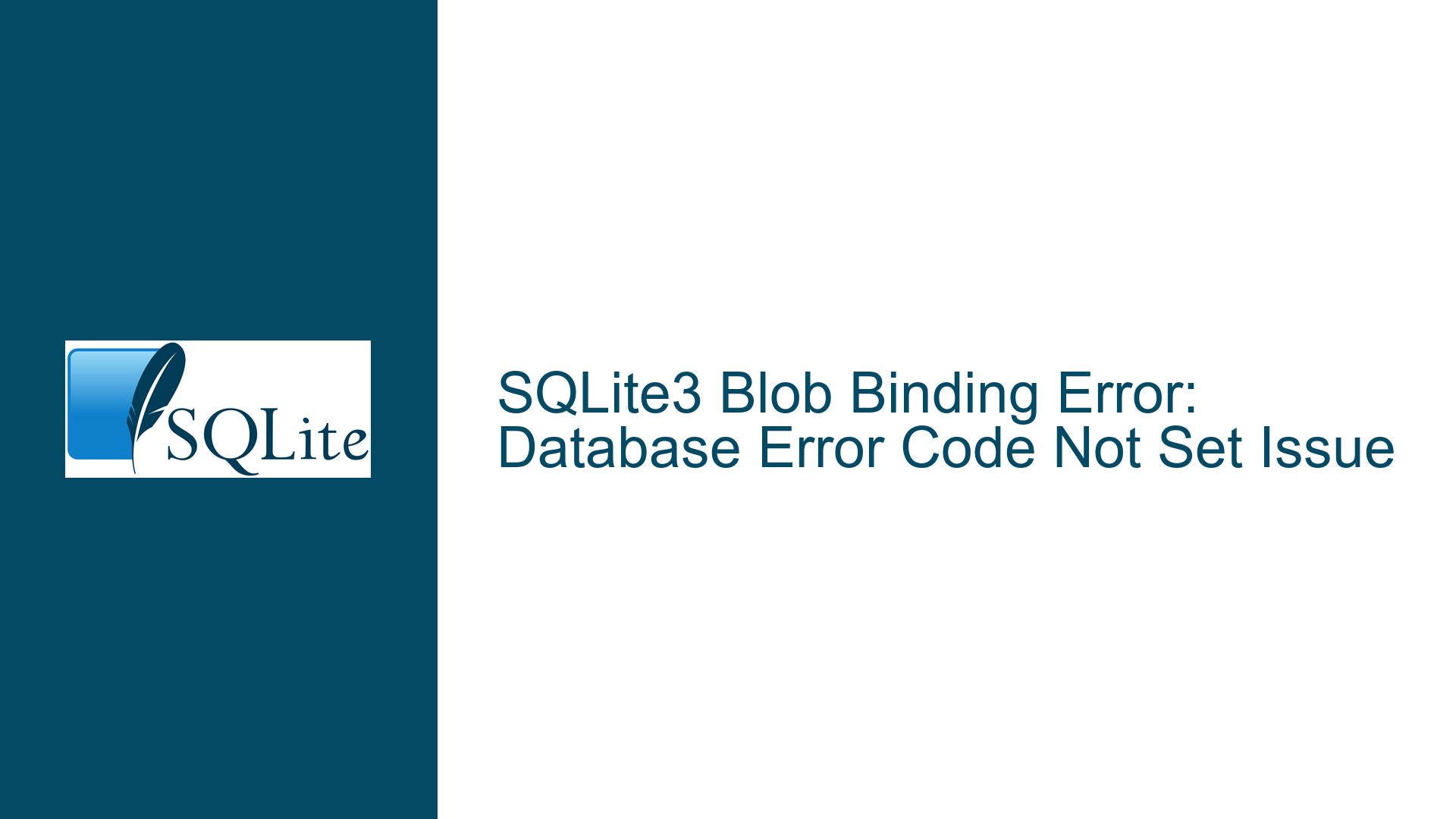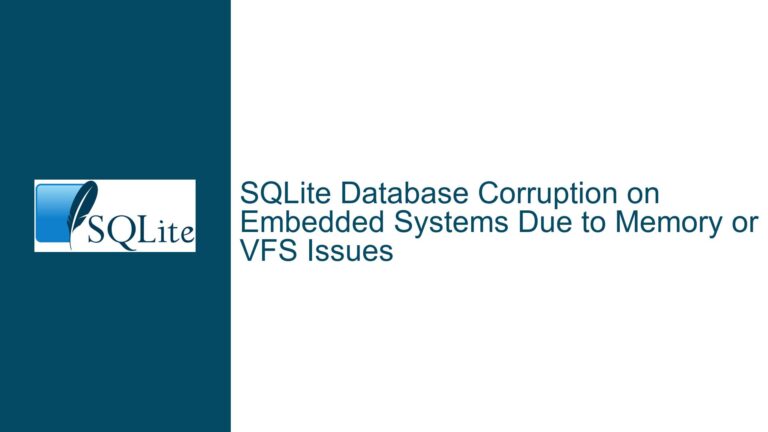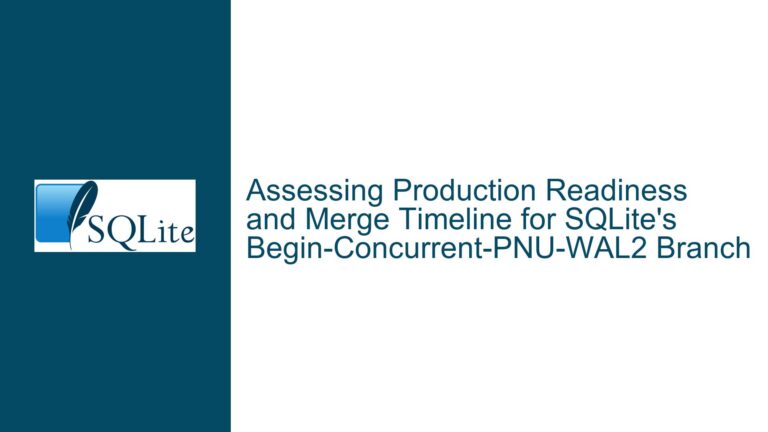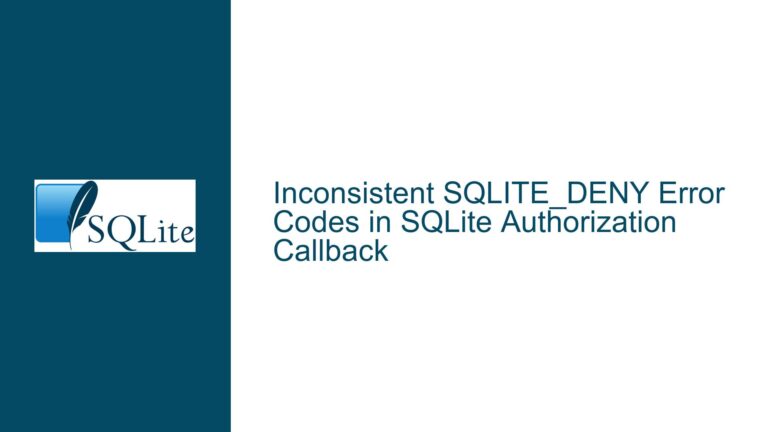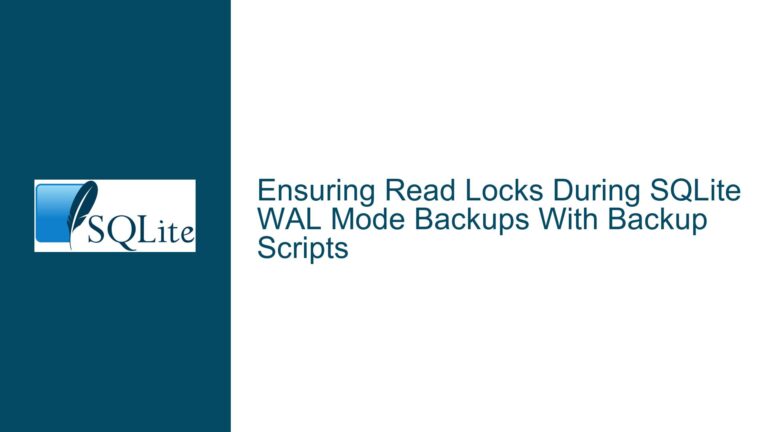SQLite3 Blob Binding Error: Database Error Code Not Set Issue
Understanding the sqlite3_bind_blob64 Error Code Mismatch
The core issue revolves around the behavior of the sqlite3_bind_blob64 function in SQLite, specifically when it returns an SQLITE_ERROR but fails to set an appropriate error message on the corresponding sqlite3 handle. Instead of providing a meaningful error message, the error state reads "not an error," which is contradictory and confusing. This discrepancy raises questions about whether this is intended behavior or a bug in the SQLite library.
The sqlite3_bind_blob64 function is designed to bind a binary large object (BLOB) of up to 2^64 bytes in size to a prepared statement. When this function fails, it is expected to return an error code and set an appropriate error message on the database handle, which can be retrieved using sqlite3_errmsg. However, in this case, the function returns SQLITE_ERROR but does not provide a meaningful error message, leaving developers unable to diagnose the root cause of the failure.
This issue is particularly problematic because error handling is a critical aspect of database operations. Without clear and accurate error messages, developers are left in the dark about what went wrong, making debugging and troubleshooting significantly more challenging. The lack of a proper error message also raises concerns about the reliability of the function and its adherence to SQLite’s error-handling conventions.
Potential Causes of the sqlite3_bind_blob64 Error Code Mismatch
Several factors could contribute to the observed behavior of sqlite3_bind_blob64. Understanding these potential causes is essential for diagnosing and resolving the issue.
1. Incorrect Usage of sqlite3_bind_blob64 Parameters:
One possible cause is incorrect usage of the function’s parameters. The sqlite3_bind_blob64 function requires specific parameters, including the prepared statement handle, the parameter index, a pointer to the BLOB data, the size of the BLOB, and a destructor function. If any of these parameters are invalid or improperly specified, the function may fail to execute correctly. For example, passing a null pointer for the BLOB data or an invalid parameter index could result in an SQLITE_ERROR without a corresponding error message.
2. Memory Allocation Issues:
Another potential cause is memory allocation problems. Binding a large BLOB requires allocating sufficient memory to hold the data. If the system is unable to allocate the necessary memory, the function may fail. However, in such cases, SQLite typically sets an appropriate error message, such as "out of memory." The absence of such a message suggests that the issue may not be related to memory allocation.
3. Internal State Corruption:
Internal state corruption within the SQLite library could also lead to this issue. If the internal state of the sqlite3 handle or the prepared statement is corrupted, the function may fail to set the correct error message. This could occur due to bugs in the SQLite library, improper use of the API, or external factors such as memory corruption.
4. Concurrency Issues:
Concurrency issues could also play a role. If multiple threads are accessing the same sqlite3 handle or prepared statement simultaneously, race conditions could lead to inconsistent behavior. For example, one thread might attempt to bind a BLOB while another thread is in the process of modifying the prepared statement, leading to an error without a proper message.
5. SQLite Version-Specific Bugs:
The issue could be specific to a particular version of SQLite. If the behavior is not consistent across different versions, it may indicate a bug that was introduced or resolved in a specific release. Checking the version of SQLite being used and comparing it with the documentation and known issues for that version could provide insights into the problem.
Diagnosing and Resolving the sqlite3_bind_blob64 Error Code Mismatch
To address the issue, a systematic approach is required to diagnose the root cause and implement an appropriate solution. The following steps outline a comprehensive troubleshooting process.
1. Verify Function Parameters:
The first step is to verify that the parameters passed to sqlite3_bind_blob64 are correct. Ensure that the prepared statement handle is valid and that the parameter index is within the valid range. Check that the pointer to the BLOB data is not null and that the size of the BLOB is correctly specified. Additionally, ensure that the destructor function, if used, is correctly implemented.
2. Check for Memory Allocation Issues:
Next, check for memory allocation issues. Monitor the system’s memory usage and ensure that sufficient memory is available for the BLOB data. If memory allocation fails, SQLite should set an appropriate error message. If the error message is still missing, consider testing with smaller BLOBs to see if the issue persists.
3. Examine Internal State:
Examine the internal state of the sqlite3 handle and the prepared statement. Use debugging tools to inspect the state of these objects before and after the call to sqlite3_bind_blob64. Look for any signs of corruption or inconsistency that could indicate a problem with the internal state.
4. Investigate Concurrency Issues:
If the application is multi-threaded, investigate potential concurrency issues. Ensure that the sqlite3 handle and prepared statement are not accessed concurrently by multiple threads. Use synchronization mechanisms such as mutexes to protect access to these objects and prevent race conditions.
5. Test with Different SQLite Versions:
Test the application with different versions of SQLite to determine if the issue is version-specific. Compare the behavior of sqlite3_bind_blob64 across different releases and consult the SQLite changelog for any relevant bug fixes or changes. If the issue is resolved in a newer version, consider upgrading to that version.
6. Review SQLite Documentation and Community Feedback:
Review the SQLite documentation for sqlite3_bind_blob64 to ensure that the function is being used correctly. Additionally, consult the SQLite community forums and mailing lists for any reports of similar issues. The community may provide insights or workarounds that can help resolve the problem.
7. Implement Error Handling Workarounds:
If the issue persists and no clear solution is found, consider implementing error handling workarounds. For example, you could wrap the call to sqlite3_bind_blob64 in a custom function that checks for SQLITE_ERROR and provides a default error message if none is set. This approach can help mitigate the impact of the issue while a permanent solution is sought.
8. Report the Issue to SQLite Developers:
If the issue appears to be a bug in the SQLite library, consider reporting it to the SQLite developers. Provide a detailed description of the problem, including the steps to reproduce it, the version of SQLite being used, and any relevant code snippets. The developers may be able to provide a fix or workaround in a future release.
9. Consider Alternative Approaches:
If the issue cannot be resolved and is causing significant problems, consider alternative approaches to binding BLOBs. For example, you could use the older sqlite3_bind_blob function, which has a smaller size limit but may be more stable. Alternatively, you could store the BLOB data in a separate file and store the file path in the database, reducing the reliance on SQLite’s BLOB handling.
10. Monitor for Future Updates:
Finally, monitor for future updates to the SQLite library that may address the issue. Regularly check the SQLite website and release notes for any updates or patches that could resolve the problem. Applying updates promptly can help ensure that your application remains stable and secure.
By following these troubleshooting steps, you can systematically diagnose and resolve the issue with sqlite3_bind_blob64. While the lack of a proper error message is frustrating, a thorough approach can help uncover the root cause and implement an effective solution. Whether the issue is due to incorrect usage, memory allocation problems, internal state corruption, concurrency issues, or a version-specific bug, the steps outlined above provide a comprehensive framework for addressing the problem and ensuring the reliability of your SQLite-based application.
